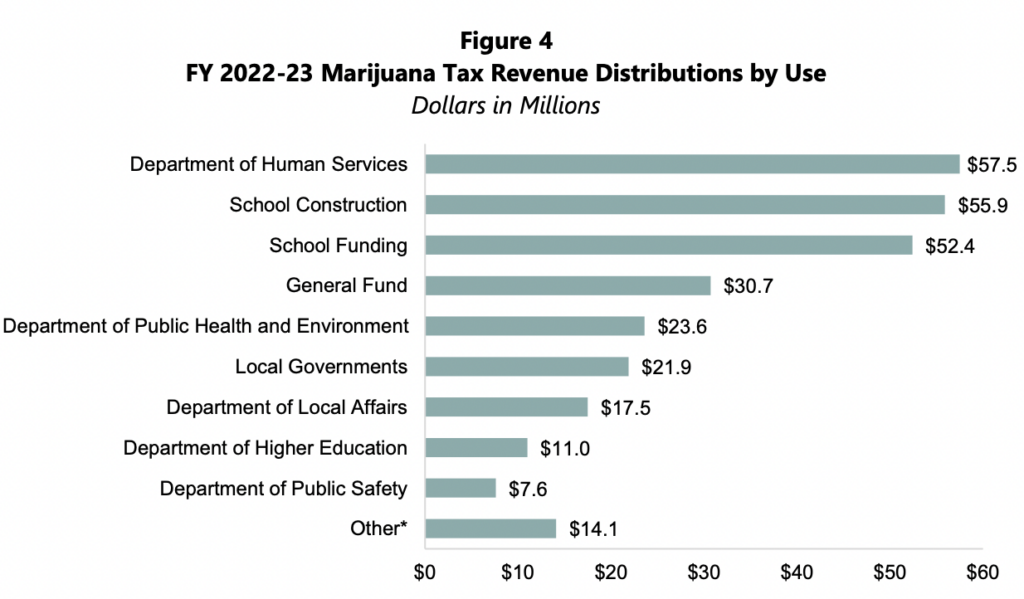Colorado generated more tax revenue from marijuana than alcohol or cigarettes during the last fiscal year, with $280 million in cannabis tax dollars going toward a variety of government programs and services like K–12 education and health care.
An analysis from the state’s nonpartisan Legislative Council Staff (LCS) released on Wednesday showed that even though annual marijuana tax revenue has decreased significantly over the past two years, marijuana sales are still contributing more funds to Colorado’s budget than other regulated substances.
In fact, tax revenue from marijuana in the past year amounted to nearly as much as the state generated from alcohol ($56 million) and cigarettes ($234 million) combined. Cannabis tax revenue also surpassed that of non-cigarette tobacco products ($61 million) and nicotine products ($56 million) in Fiscal Year 2022-2023.
Via LCS.
The LCS economic analysis also details how the state is spending its cannabis tax revenue, with money being divided among several programs, such as substance misuse treatment, early childhood literacy, youth mentorship and bullying prevention, law enforcement training, affordable housing, research and illicit market interdiction.
Here are some examples of how the cannabis revenue is being spent for the current fiscal year:
- K-5 Social and Emotional Health Pilot Program: $2.5 million
- School Bullying Prevention and Education: $1 million
- Mental health services for juvenile and adult offenders: $6.1 million
- Affordable Housing Construction Grants and Loans: $15.3 million
- Black market marijuana interdiction/state toxicology lab: $4.4 million
- Marijuana impaired driving campaign: $1 million
- Substance abuse prevention: $10.1 million
- Pesticide control and regulation: $1.2 million
“Taking into account the statutory distributions and the [Marijuana Tax Revenue and Education] appropriations, K-12 education received about 37 percent of total spending from marijuana revenue for school funding and school construction,” the report says. “The Department of Human Services received about 20 percent for a variety of programs, including those focused on behavioral health and addiction.”

Via LCS
The revenue comes from two distinct taxes that are imposed on adult-use marijuana products: a 15 percent excise tax and a 15 percent special sales tax. The total also includes revenue from the sale of medical cannabis products, which are subject to a 2.9 percent sales tax.
The state’s total yield for this past year was down about $140 million compared to its high of about $425 million in 2021, with revenue returning to Fiscal Year 2018–2019 levels as sales decreased.

Via LCS.
This isn’t the first time that Colorado has seen cannabis tax dollars outpace that of alcohol or cigarettes. A separate analysis published last year also observed that trend in both Colorado and Washington State during the 2021–2022 Fiscal Year. Another eight states generated more tax revenue from marijuana than cigarettes during that time period, as well.
In Arizona, the state generated more tax revenue to the general fund from legal marijuana sales than from tobacco and alcohol combined in March 2022.
Massachusetts also started collecting more tax revenue from marijuana than alcohol, state data released last year shows. As of December 2021, the state took in $51.3 million from alcohol taxes and $74.2 million from cannabis at the halfway point of the fiscal year.
Illinois saw cannabis taxes beat out booze for the first time in 2021, with the state collecting about $100 million more from adult-use marijuana than alcohol that year.
A poll released by the American Psychiatric Association last month found that adults consider marijuana to be significantly less dangerous than cigarettes, alcohol and opioids. Respondents said cannabis is less addictive than each of those substances, as well as technology.
Relatedly, a Gallup poll released this month shows that fully half of Americans have tried marijuana, and more people now actively smoke cannabis than cigarettes.
—
Marijuana Moment is tracking more than 1,000 cannabis, psychedelics and drug policy bills in state legislatures and Congress this year. Patreon supporters pledging at least $25/month get access to our interactive maps, charts and hearing calendar so they don’t miss any developments.![]()
Learn more about our marijuana bill tracker and become a supporter on Patreon to get access.
—
A Colorado law that allows for online marijuana sales officially took effect this month, giving consumers a new method of ordering cannabis more than a decade after the state enacted legalization.
Gov. Jared Polis (D) also recently signed legislation that will bolster marijuana-related protections for working professionals in the state, effectively codifying an executive order he issued last year.
In May, he signed another bill to create a regulatory framework for legal psychedelics under a voter-approved initiative.
Polis said in an interview this month that his state’s moves to legalize marijuana and psychedelics have resulted in a “very good” experience—and he believes that adults broadly should have the right to make decisions for themselves about using drugs.
Minnesota Indian Tribe Plans To Launch Marijuana ‘Food Truck’ To Expand Business Across The State
Read the full article here








